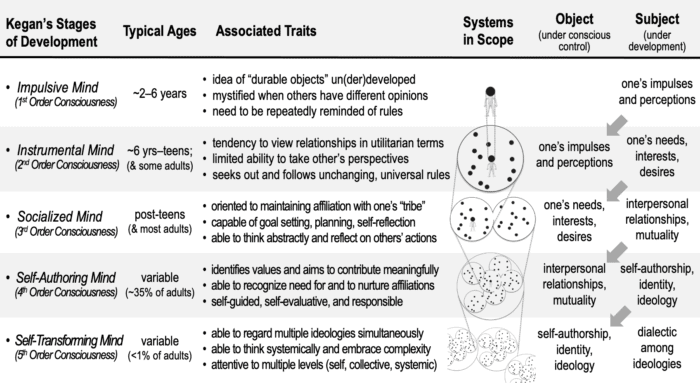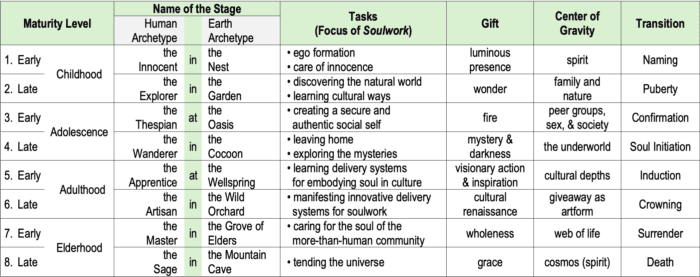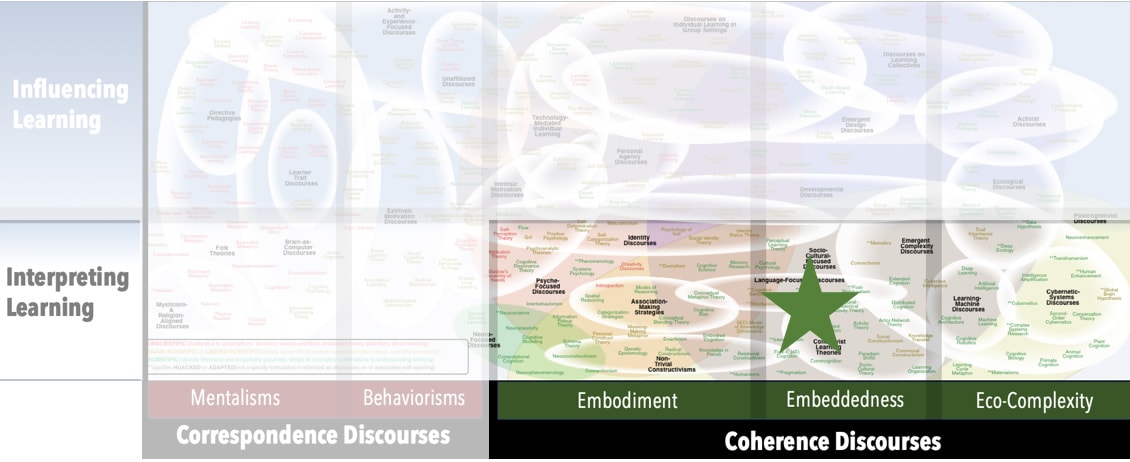AKA
Subject-Object Theory
Focus
Increasingly sophisticated modes of consciousnessPrincipal Metaphors
- Knowledge is … the range of developmental possibility
- Knowing is … meaning, as framed by current mode of consciousness
- Learner is … an individual
- Learning is … making and remaking meaning
- Teaching is … challenging
Originated
1980sSynopsis
Constructive-Developmental Theory focuses on one’s evolving modes of making meaning of experience, starting in infancy and extending through the entire lifespan. It posits five qualitatively distinct and increasingly complex levels/modes/orders of consciousness (i.e., ways of perceiving and engaging with/in the world) across which the individual first develops some mastery over impulses and perceptions, then needs and desires, and then interpersonal relationships. That’s as far as most adults get but some also achieve a self-authoring consciousness, and a few manage a self-transforming, systems-oriented, non-egocentric mode. Because Kegan’s model is increasingly consequential in education, brief descriptions of his identified stages are warranted: Assessment tools and strategies associated with Constructive-Developmental Theory include:
Assessment tools and strategies associated with Constructive-Developmental Theory include:
- Subject-Object Interview (Robert Kegan, 1980s) – an tool to assess where one might land among the levels of consciousness described within Constructive-Developmental Theory – that is, an assessment of the scope or complexity of one’s consciousness
- Five Structures of Consciousness (Jean Gebser, 1940s) – Defining consciousness in terms of “wakeful presence,” and framing shifts in consciousness as structural changes to both mind and body, this model posits five structures that operate at both individual and collective levels: Archaic (pre-conscious undifferentiation), Magic (pre-explanation awareness), Mythical (self-narrating soul), Mental (rational observer), and Integral (“presentiated” participant).
- Emergent Cyclical Theory (Clare Graves, 1970s) – an open-ended, stage-based developmental model of bio-psycho-social coping systems that are manifest at personal, cultural, and species levels. The theory comprises pairings of existential problems with emergent coping systems, which are either parallel (in which case, problems readily handled) or non-parallel (in which case, stress and frustrations will be experienced). The theory also describes the change process involved in developing new coping systems.
- Stages of Ego Development (Loevinger's Stages of Ego Development) (Jane Loevinger, 1970s) – Framing ego as a process, rather than as an object or entity, this model draws on Interpersonal Theory as it posits a sequence of increasingly complex modes of perceiving of oneself and one’s relationship to the world. Nine stages are proposed, the last six of which unfold in adulthood: Symbiotic; Impulsive; Self-Protective; Conformist; Self-Aware (Conscientious-Conformist); Conscientious; Individualistic; Autonomous; Integrated.
- Ego Development Theory (Susanne Cook-Greuter, 1980s) – The model builds on Stages of Ego Development (see above) as it traces development from nonconscious union with the mother to conscious union with everything. The ego’s task is framed in terms of three categories of meaning making: operative (purpose-oriented), affective (emotions and experience), and cognitive (thinking and reasoning). Four clusters of stages are posited:
- Preconventional Stages (1. Symbiotic; 2. Impulsive; 2/3. Self-Protective; Δ3. Rule-Oriented)
- Conventional Stages (3. Group-Centric/Conformist/Diplomat; 3/4. Skill-Centric/Self-Conscious/Expert; 4. Self-Determining/Conscientious/Achiever)
- Postconventional Stages (4/5. Self-Questioning/Individualist/Pluralist; 5. Self-Actualizing/Autonomous/Strategist; 5/6. Construct-Aware/Ego-Aware/Magician/Alchemist)
- Transcendent Stage (6. Unitive)
- Stages of Faith (Fowler Faith Stages) (James William Fowler III, 1980s) – a developmental model of human faith, positing seven stages: Primal/Undifferentiated (0–2 years), Intuitive-Projective (2–7 years), Mythic-Literal (7–12 years) Synthetic-Conventional (12+ years), Individuative-Reflective (~25+ years), Conjunctive ~35+ years), and Universalizing (~45+ years)
- Spiral Dynamics (Don Edward Beck, Christopher Cowan, 1990s) – Oriented by evolutionary theory and based on a blend of Emergent Cyclical Theory (see above) and Memetics, Spiral Dynamics is a stage-based model of the co-emergence of value systems and worldviews through the dynamic interplay of mind capacities and the conditions of existence. In order, the value systems are SurvivalSense (Instinctive), KinSpirits (Clannish), PowerGods (Egocentric), TruthForce (Purposeful), StriveDrive (Strategic), HumanBond (Relativistic), FlexFlow (Systemic), and GlobalView (Holistic).
- Vertical Development Theory Suzanne Cook-Greuter, 2000s) – a seven-stage model aimed at the complexification of one’s worldview/mindset through interrogating one’s frames of interpretation, restructuring one’s habits of acting, and integrating the varied aspects of one’s being. The stages (and their foci) are: 1. Opportunist (gaining personal advantage); Diplomat (earning approval); 3. Expert (garnering respect); 4. Achiever (gaining recognition); 5. Redefining (seeking meaning); 6. Transforming (contributing to the greater good); 7. Alchemical (seeking Flow). Associated notions include:
- Horizontal Development – the gaining and honing of skills and capabilities that are needed to function within one’s current frame
Notably, western discourses on varied modes of consciousness tend to revolve around notions of stages of consciousness that are associated with growing up. In contrast, non-western discourses tend to be more concerned with states of consciousness that are associated with waking up. Illustrative discourses include:
- Brahmavihārās (Divine Abodes; Four Illimitables; Four Immeasurables; Four Infinite Minds; Four Sublime States [of Mind]; Four Sublime Virtues; Modes of Sublime Conduct; literal translation: “Abodes of Brahma”) – a set of four “sublime states” (note: “sublime” means “awe-inspiring beauty or excellence”) along with the meditative/mindfulness practices that are designed to bring them forward in one’s life. They should have no limits and should be extended to all living beings. The Brahmavihārās are rooted in Buddhism, but they are highly reflective of constructs found in Hinduism, Sikhism, and Jainism. The four virtues are:
- Mettā (Maitrī) – translations include kindness, loving-kindness, benevolence, geniality, friendliness, amity, sympathy, love. Mettā has to do with the kindness toward others, enacted in ways that enable those others to embody the same virtue.
- Karuṇā – translations include compassion, mercy, spiritual longing. Karuṇā is a sort of empathetic engagement with the tribulations of others – listening for need, allowing others’ experiences into one’s own, and being willing to assist as well as one is able, all oriented by a desire for all to be rid of distresses, pains, and afflictions.
- Muditā – translations include sympathetic joy, vicarious joy. Muditā has to do with experiencing delight in others’ wisdom and well-being, regardless of who those others might be.
- Upekkhā (Upekṣā) – translations include equanimity, even-mindedness, serenity, impartial engagement. Upekkhā is a mode of being that revolves around a calm awareness and persistent acceptance of the impermanence of reality. It manifests as freedom from attachment to things and impartial engagement with living beings.
- Eco-Soulcentric Stages of Life (Bill Plotkin, 2000s) – an eight-stage model of human development concerned with “psychospiritual transformations” or Soulwork:
- Soulwork – the process of discovering and aligning with one’s uniqueness and deeper purpose in life, whereby one’s “soul” is understood as one’s unique, personal connection to the grander web of life

Commentary
Criticisms of Constructive-Developmental Theory tend to be similar to those leveled against other Developmental Discourses, particularly those associated with Psychoanalytic Theories. Most prominently, Constructive-Developmental Theory is seen by many to be culturally myopic. One criticism that Constructive-Developmental Theory avoids is that it might be normative, owing to the fact that its stages are not indexed to ages (although they are correlated).Authors and/or Prominent Influences
Robert Kegan; Otto LaskeStatus as a Theory of Learning
Constructive-Developmental Theory is a theory of learning.Status as a Theory of Teaching
Constructive-Developmental Theory is not a theory of teaching. It does offer occasional advice to educators, however. For example, because its stages aren’t rigidly indexed to ages, Constructive-Developmental Theory is useful for interpreting how and why classmates can make very, very different meanings of similar experiences – along with suggestions on the sorts of experiences and supports that might encourage learners to develop sensibilities that enable them to act in more context-appropriate ways.Status as a Scientific Theory
Constructive-Developmental Theory meets most of our criteria of scientific theories. Its focus is explicit, its images and metaphors are carefully selected and deployed, and it does have an evidence base.Subdiscourses:
- Brahmavihārās (Divine Abodes; Four Illimitables; Four Immeasurables; Four Infinite Minds; Four Sublime States [of Mind]; Four Sublime Virtues; Modes of Sublime Conduct)
- Eco-Soulcentric Stages of Life
- Ego Development Theory (Loevinger’s Stages of Ego Development)
- Emergent Cyclical Theory
- Five Structures of Consciousness
- Horizontal Development
- Impulsive Mind (1st Order Consciousness)
- Instrumental Mind (2nd Order Consciousness)
- Karuṇā
- Mettā (Maitrī)
- Muditā
- Socialized Mind (3rd Order Consciousness)
- Self-Authoring Mind (4th Order Consciousness)
- Self-Transforming Mind (5th Order Consciousness)
- Soulwork
- Spiral Dynamics
- Stages of Ego Development
- Stages of Faith (Fowler Faith Stages)
- Subject-Object Interview
- Upekkhā (Upekṣā)
- Vertical Development Theory
Map Location

Please cite this article as:
Davis, B., & Francis, K. (2025). “Constructive-Developmental Theory” in Discourses on Learning in Education. https://learningdiscourses.com.
⇦ Back to Map
⇦ Back to List
